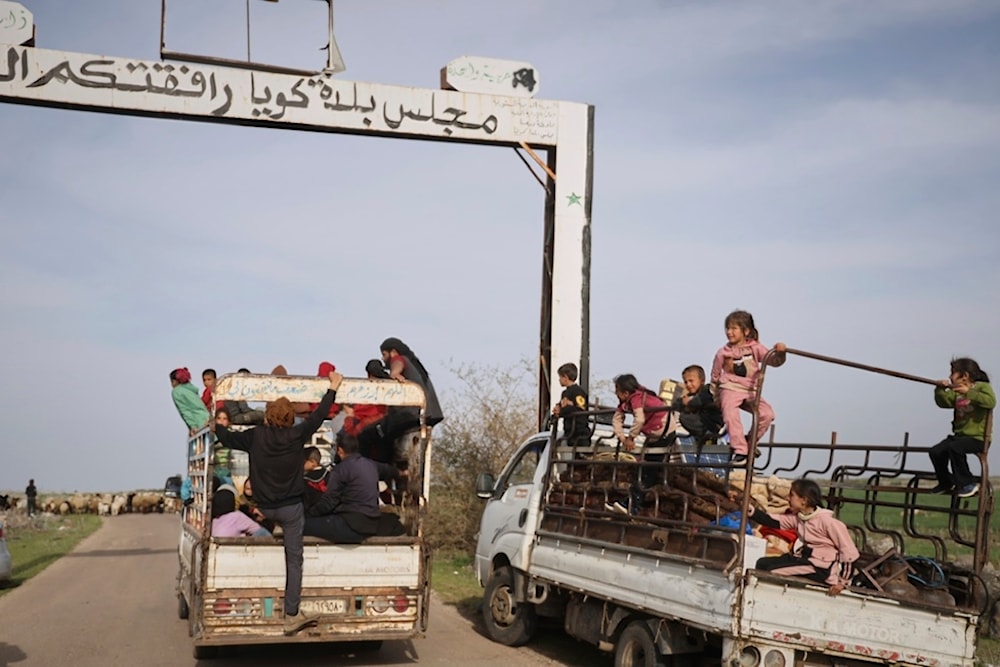US gives Syria list of conditions for sanctions relief
The United States is offering Syria the opportunity to gain sanction relief in exchange for several demands, including banning foreigners from holding senior government positions.
-

Local residents ride in the back of vans as they are evacuated due to fears of Israeli incursions on the outskirts of the village of Koayiah, southwestern Syria, Tuesday, March 25, 2025 (AP)
The United States has handed Syria a list of conditions that Damascus must meet in exchange for partial sanctions relief, including ensuring that foreigners do not hold senior positions in government, according to six sources familiar with the matter, Reuters reported on Tuesday.
US Deputy Assistant Secretary for the Levant and Syria, Natasha Franceschi, conveyed the demands to Syrian Foreign Minister Asaad al-Shibani during a meeting on the sidelines of a Syria donor conference in Brussels on March 18, two sources, a US official and a Syrian source, revealed.
This meeting marks the first high-level direct contact between Washington and Damascus since US President Donald Trump took office in 2017.
Among the US conditions are Syria’s destruction of any remaining chemical weapons stockpiles and cooperation on counterterrorism, according to two US officials, a Syrian source, and additional sources in Washington.
Another demand is ensuring that foreign fighters do not occupy senior roles within the government. The issue has drawn international concern, as Syria has reportedly appointed former foreign rebels, including Uyghurs, a Jordanian, and a Turk, to its defense ministry.
Condemnation of coastal massacres
Meanwhile, US Secretary of State Marco Rubio issued a statement condemning the recent violence in western Syria, where hundreds of civilians from the Alawite minority were killed in a massacre that spanned several days earlier in March.
Rubio denounced “radical Islamist terrorists, including foreign jihadis” for the attack and urged Syria’s interim authorities to hold the perpetrators accountable.
According to sources, the White House initially pushed for a stronger statement, while the State Department sought to adopt a more balanced tone.
Last month, Reuters reported that the Israeli occupation had been lobbying the US to maintain Syria in a weakened and decentralized state.
While the US administration has not fully aligned with the Israeli stance on discouraging engagement with Syria’s new leadership, some of the occupation's concerns are gaining traction among American officials.
Governmetn founds committee to probe
The government itself has stated that it founded an investigative committee to probe into the violence that took place and promised to hold those responsible accountable for their atrocities against civilians.
In an interview with Reuters published last week, interim President Ahmad al-Sharaa claimed, “Syria is a state of law,” emphasizing that “the law will take its course on all.”
He accused armed forces connected to the Assad family and supported by an unnamed foreign power of being responsible for triggering the violence, but admitted that “many parties entered the Syrian coast, and many violations occurred,” adding that the fighting eventually turned into “an opportunity for revenge” following the long and bitter civil war.
Throughout the war, which claimed the lives of tens of thousands according to estimates, numerous rebel factions emerged to oppose al-Assad, with some eventually joining forces with al-Sharaa's extremist rebel group in the final battle that led to the former regime's downfall.
A group of Syrian rebel leaders appointed al-Sharaa as the interim President of the new Syrian administration, and since then, he vowed to combine all the country's former fighter groups into one single army, however, in less than a month since his appointment, the massacres along the Syrian coast took place.
Six EU members advocate for temporary suspension of Syria sanctions
Six European Union member states urged the bloc to temporarily suspend certain sanctions on Syria, specifically in areas such as transport, energy, and banking, Reuters reported in January, citing a document.
EU foreign ministers are scheduled to discuss the potential relaxation of sanctions on Syria during a meeting in Brussels on January 27.
The document, endorsed by Germany, France, the Netherlands, Spain, Finland, and Denmark, stated that the EU "should immediately begin adjusting our sanctions regime."
However, the paper cautioned that if Syria fails to meet the EU's expectations regarding human rights and minority protections, further sanctions may remain in place, and previously lifted measures could be reinstated through a snapback mechanism.
Earlier in the month, the United States issued a six-month sanctions exemption for transactions with Syrian governing institutions to facilitate humanitarian aid.
The six EU member states proposed lifting sanctions to enable civilian flights, reevaluating restrictions on high-value goods, removing the export ban on oil and gas technology, and reopening financial channels between the EU and Syria.

 4 Min Read
4 Min Read








